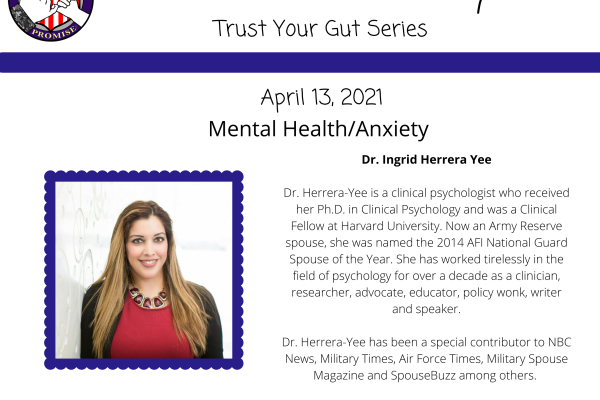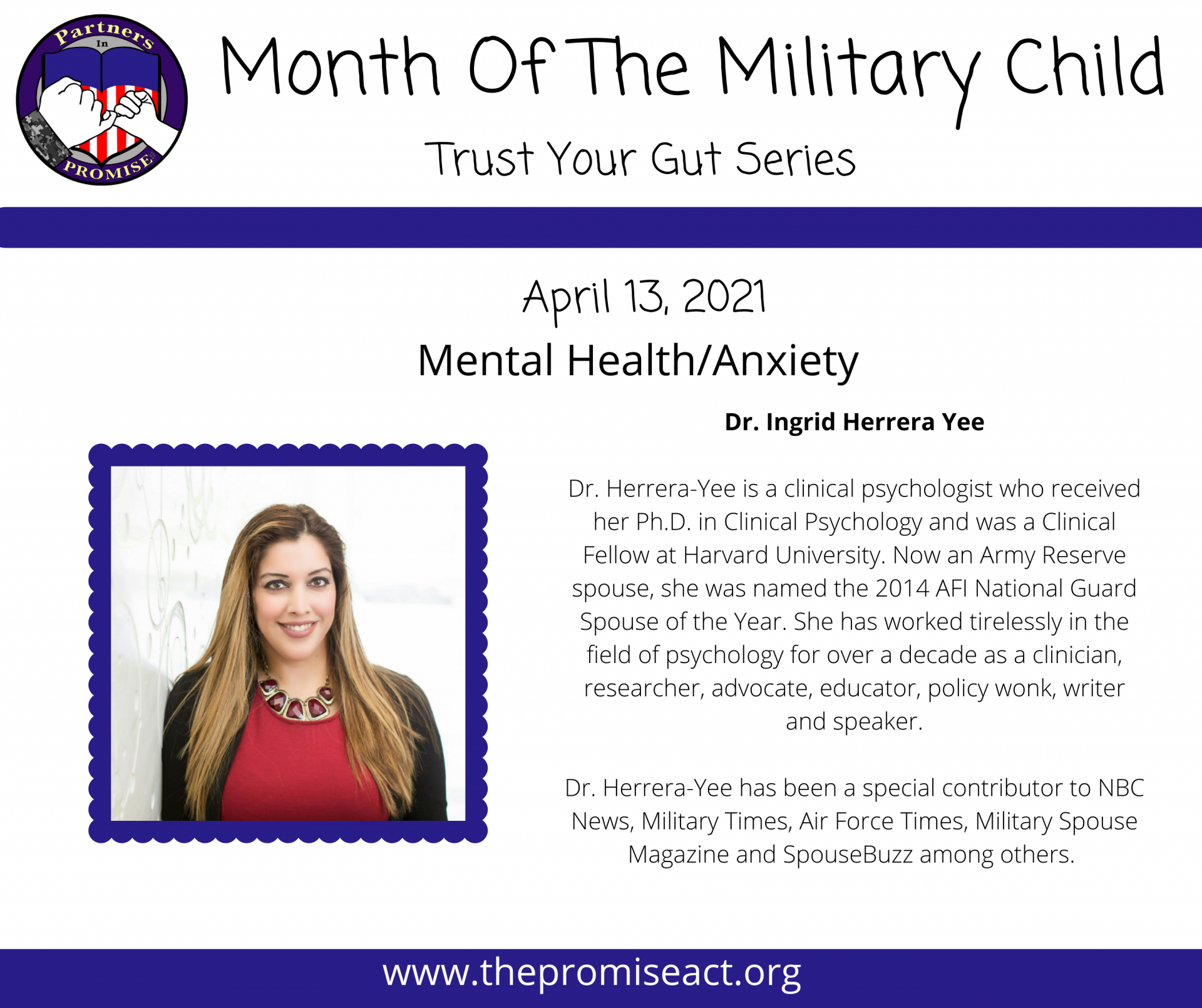
Trust Your Gut – Mental Health
| Resources, Trust Your Gut Series
Dr. Yee speaks about recognizing mental health issues in your child:
“There are so many signs but you should pay attention to any change from THEIR normal. If they are normally a shy kid and you see they are a little shyer. But if they were extroverted and social and suddenly shut down quiet shy that could be a sign that something further is going on with them. Kids look different when suffering from things like depression and anxiety for them it’s more irritability and anger and that can sometimes be hard to pick apart when dealing with a teenager.”
Partners in PROMISE COO Jennifer Barnhill interviewed Dr. Ingrid Herrera Yee to help understand how to recognize underlying mental health concerns in your child, separating fact from fiction in this session of Trust Your Gut.
If you are concerned about your child (or yourself) do not wait! Ask for help and utilize the FREE resources provided by Military OneSource mentioned in this episode. Many of them are 100% anonymous.
If you or someone you know is in crisis, contact the Military Crisis Line at 800-273-8255, then press 1, or access online chat by texting to 838255.

Military Crisis Line
- The Military Crisis Line connects a person in need to a trained counselor with a single phone call or click of a mouse.
- This confidential, immediate help is available 24/7 at no cost to active-duty, Guard and reserve members, their families and friends.
- In the United States call 800-273-8255, then press 1, or access online chat at the Military Crisis Line or by texting to 838255.
Mental health conditions
- TRICARE is the health care program for military members and their families. The program is divided into two regions (East and West) and Overseas.
- The TRICARE Military Treatment Facility Locator is the locator tool for military treatment centers.
- The National Institute of Mental Health (NIMH) provides information on a variety of mental health topics and list current clinical trials that allow persons to access treatment for free. Call (866) 615-6464.
Post-traumatic stress disorder
- USA Cares pays essential household bills while a wounded service member or veteran is attending residential treatment.
- Project Valour-IT provides voice-controlled laptops and personal GPS systems to service members recovering from hand wounds and other severe injuries including traumatic brain injury and PTSD.
- National Center for Post-Traumatic Stress Disorder provides research and education on trauma and PTSD with a mission to improve the well-being and understanding of individuals who have experienced traumatic events with a focus on American veterans.
Traumatic brain injury
- Defense and Veterans Brain Injury Center created the A Head for the Future initiative to raise awareness and lower the risk of concussion. The campaign offers information about the signs, symptoms, and treatment of brain injuries and educates service members and veterans about how to prevent them.
- The Defense Centers of Excellence for Psychological Health and Traumatic Brain Injury provides information and resources about psychological health, post-traumatic stress disorder, or PTSD, and traumatic brain injury.
- Veterans Affairs Polytrauma/Traumatic Brain Injury (TBI) System of Care is an integrated network of specialized rehabilitation programs.
Domestic abuse
- The National Domestic Violence Hotline offers phone and chat services to anyone who has been affected by relationship abuse, including those who are currently in abusive relationships, those who are working to heal, friends or family of victims and survivors and anyone who has questions about domestic violence.
- Call 800-799-7233 24/7 or access live chat from 7 a.m. to 2 a.m.
- Your installation’s Family Advocacy Program or military health care provider can assist you if you’re the victim of domestic abuse.
Child abuse
- Your installation’s Family Advocacy Program will have a point of contact for child welfare and safety.
- Each state has its own civilian office dedicated to child services. A comprehensive list of contact information for each state can be found at the National Council on Child Abuse & Family Violence website.
- The Department of Defense has a designated line, 877-790-1197, for reporting of suspicions of child abuse in a Department of Defense facility. For overseas, call collect 571-372-5348 (local charges may apply).
- Help is also available through the Childhelp National Child Abuse Hotline at 800-799-7233.
Sexual assault
- The Department of Defense Safe Helpline is a crisis support service for members of the Department of Defense community affected by sexual assault that provides live, one-on-one specialized support and information.
- Available 24/7, from anywhere in the world, Safe Helpline is confidential, anonymous and secure.
- When survivors are ready, Safe Helpline staff will connect them to a Sexual Assault Response Coordinator or Sexual Assault Prevention & Response Victim Advocate.
Substance use disorders
- Free counseling services for alcohol and substance use disorders are available through the installation to service members and their family members.
- Contact your branch substance use disorder prevention program: Army Substance Abuse Program, Marine Corps Substance Abuse Program, Navy Alcohol and Drug Abuse Prevention, and Air Force Alcohol and Drug Abuse Prevention and Treatment (ADAPT) Program.
- Substance Abuse and Mental Health Services Administration National Mental Health Information Center provides referrals to outpatient, inpatient and residential treatment facilities, including affordable mental health services.
- The center offers a Behavioral Health Treatment Services Locator to assist persons seeking treatment facilities in the U.S. or U.S. Territories for substance use disorder, addiction and mental health problems. Call 800-789-2647.
Online screening tools
- Free, confidential, online screenings for anxiety, depression, mood disorders, PTSD and other conditions are available at http://www.mhascreening.org, Mental Health America’s screening service.
Moving Forward
- Moving Forward is a free, on-line educational and life coaching program that teaches problem-solving skills to help you to better handle life’s challenges. It is designed to be especially helpful for veterans, service members and their families.




Leave a Reply